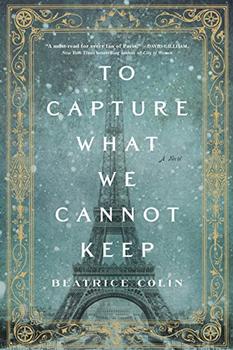Summary | Excerpt | Reading Guide | Discuss | Reviews | Beyond the Book | Readalikes | Genres & Themes | Author Bio

"Well?" said Jamie.
The image blurred, her head began to pound; it was too much. She stepped back.
"You're shaking!" Jamie laughed. "Wait until I tell my sister."
"I'm fine," she told him. "At least, I'll be fine in a minute. Go, go and make the most of it."
Despite the heat from the brazier, the air was far colder up here than on the showground. Her hands were indeed trembling, but it wasn't just the chill. What scared her most was not the thought that she might fall out of the gondola, but the sense that she might be seized at any moment by an overwhelming compulsion to jump. Since her husband's death she had often felt this panic, as if she existed in a liminal space, half in and half out of the world.
In the quiver of the heat coming from the fire, she tried to focus on something, anything. She heard a small click and turned. A man was standing behind a small wooden box on the other side of the basket, his face absorbed in thought. He wore a softly knotted bow tie and, unlike the rest of the passengers, wasn't wearing a hat. As if he felt her gaze, he blinked and looked around. For no more than a fraction of a second, their eyes met. Cait's heart accelerated, a rapid knocking against a solid wall of whalebone and wool. She swallowed and glanced away. What on earth did she think she was doing? What kind of a lady returned a man's gaze? She turned and sought other, safer distractions. Next to her a party of Americans were discussing restaurants.
"Five francs for an apple on a plate," one of the men was saying. "It was daylight robbery."
"But the wine was very reasonable," his companion pointed out.
"That may well be, but they saw me coming. I aim to avoid dining at our hotel for the remainder of my trip. The French have a nose for gullibility, so I hear."
She was suddenly aware that the man without the hat had come to her side of the balloon and was looking out across the river toward the north of the city. She concentrated wholeheartedly on listening to the Americans' accounts of terrible food and horrendous hotel experiences. But she was conscious of him, of his proximity, of the wooden box he was carrying, of his hair swept back from his forehead falling in loose, dark curls over his collar, of the rise of his frozen breath mingling with her own.
"Fleas!" one voice rang out. "Fleas everywhere!"
"I had bedbugs," another agreed. "They even got into my toothbrush."
The man took another, smaller wooden box out of the first box and carefully attached it to three metal legs. It looked like some sort of photographic device. Photography was the new craze in Paris, and she had seen dozens of men carrying those mahogany and brass boxes, strolling up and down the Quais or setting up in the Luxembourg Gardens.
She could see now that he was slightly older than he had first appeared, maybe around forty. His dark hair was flecked with gray, his coat was finely cut and his shoes polished; he looked cared for. And yet there was something in the way he moved, in the slant of his shoulders and the way he took up space in the world that she recognized. He was a man who was, or had been, lonely.
As she watched, he opened the box and extended a small concertina shape from the front. And then he stepped to the side of the gondola and leaned over. Cait felt a surge, the momentum of falling, headlong, into nothingness. Of its own accord, her hand reached out and grabbed his arm. He turned.
"Madame?" he said.
"Excuse me," she blurted out in French. "But you looked as if you were about to—"
Cait opened her mouth but couldn't say the word.
"Throw myself over the edge?" he asked in French.
She blinked at him.
"I was going to say 'fall.'"
"Not today, but thank you for your concern," he said.
He glanced down to where her hand still gripped his sleeve. It was her left hand, bare now of the wedding band she used to wear.
Excerpted from To Capture What We Cannot Keep by Beatrice Colin. Copyright © 2016 by Beatrice Colin. Excerpted by permission of Flatiron Books. All rights reserved. No part of this excerpt may be reproduced or reprinted without permission in writing from the publisher.
Your guide toexceptional books
BookBrowse seeks out and recommends the best in contemporary fiction and nonfiction—books that not only engage and entertain but also deepen our understanding of ourselves and the world around us.